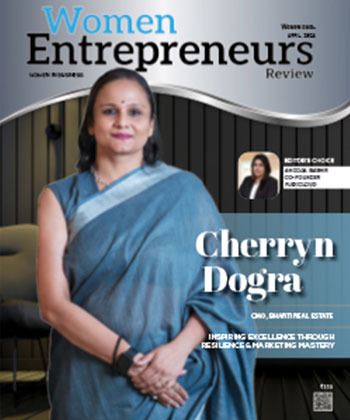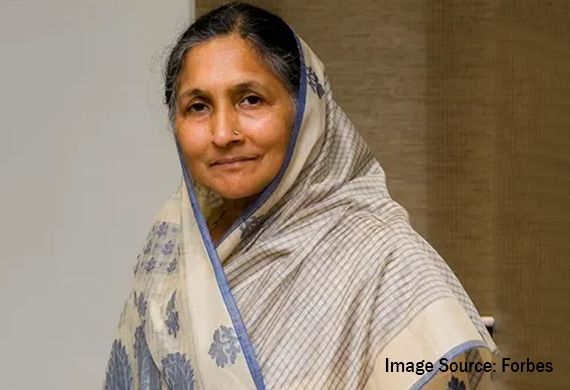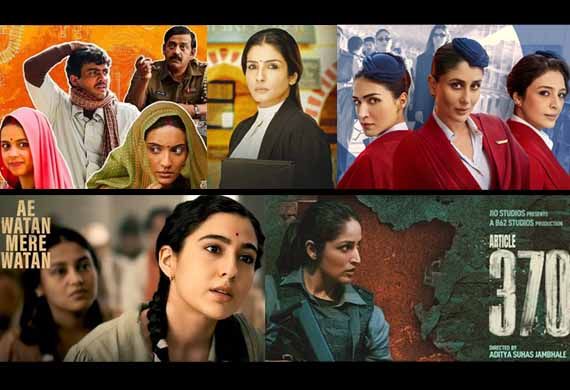
Daalchini's Prerna Kalra is the Mastermind behind Popularizing Fresh Food Vending Machines
By: WE Staff | Saturday, 30 July 2022
Often times it is the simplest ideas that create the biggest impact. Case in point is the retail industry which has been revolutionized owing to a tech makeover. Today the industry has a tonne of delivery apps, grocery apps, and payment apps that make life simpler for consumers. However, none of them do anything to ease the load on retailers, especially the ones who run ‘kirana stores’. These retailers often have to spend the entire day supplying goods to customers even though the peak selling period lasts only a few hours.
Technocrat Prerna Karla observed this from close quarters as her parents also ran a kirana store in a Tier 2 city. On the flip side she observed how automation was being leveraged inretail stores across China and Japan in order to ease the burden on the retailers. The solution to the problem was right in front of her. Prernadeveloped the idea further to dispense freshly cooked food and packed food supplies through conveniently located kiosks & vending machines. This is how Daalchini Technologies came into being in 2018.
Daalchinitoday leverages AI and its proprietary Algorithm for managing cooked food and packed food supplies for kiosks and ensuring zero wastage. The brand offers 100 percent contactless food options and snacks with IoT enabled unmanned kiosks and has been catering to patient attendants in healthcare setups, students in academic institutions and employees of manufacturing plants with contactless pantries, drivers and bus owners with smart mobility kiosks.
The company helps consumers address their 24*7 snacks and food wants. Daalchini has so far worked with the likes of Reliance, Times Internet, Dell, TCS, Snapdeal, E&Y, Fortis, Apollo, Vivo, OYO, JW Marriott, Smartworks, Innov8, 91springboard, etc for providing pantry service via its smart vending machines.
The Women Entrepreneur team had the chance to speak with the creator of Daalchini and learn more about the technology and vending machines. Check out the interview.
Tell us about Daalchini. What is the underlying idea or principle behind the firm?
We created the retail technology platform Daalchini as a solution for our country's retailers, who essentially stand all day in their stores and sell products. With the help of the technology developed by us, we turned their stores into pilot projects and provided them with an unmanned solution using vending machines, smart retail, smart fridges, etc. Currently, we operate in roughly 800 locations throughout 18 cities and support 200+ similar shops or franchisee partners. Through the use of vending machines, we have truly upgraded or advanced the technology of retail stores.
I hail from a tier two city where my parents still run a Kirana shop. I've witnessed the challenges faced by Kirana store owners first hand. There are around 40 to 50 top-selling SKUs that are only sold at peak times. However, the individual must constantly be present in the store. Although there are numerous eCommerce and grocery apps, nothing has significantly improved the life of these retailers despite the digitization of payments.
That is what Daalchini is attempting to achieve; we are building a platform through which anyone can launch a smart store or a vending business employing our technology.
For an instance Reliance operates the biggest refinery in the world. Reliance employed employees from over 90 different nations to sell products manually around-the-clock. We used Daalchini’s proprietary technology to automate them all. Today, about 20 odd people administer all of those nations without having to work full-time or in a rigid schedule. Through the use of Daalchini’s technology, they can cater to the needs of the populace in a more hygienic and customer-friendly manner.
Take us through the early stages of creating the idea, establishing the business, and building it up.
Prior to turning an entrepreneur in 2018, I had worked with Paytm for over eight years. This experience helped me gain more knowledge about the retail industry. I saw how entrepreneurs struggled, how technology evolved, and how people's standards of living increased. During my trip to China, I visited stores where everyone simply remained in the storefronts and everything else was automated. Upon my return to India I still saw my parents hustling the entire day to sell items in the store. Even though we are only a border away, yet there existed a wide gap.
The vending machine's inventory management is the other issue. People mainly used vending machines for packaged food, but in other nations like China, Japan, and the US, perishable food, bakery goods, eggs, cakes, milk, and proper sandwiches were the main drivers of consumption. However in India, this was not the case. We needed an overhaul of the technology through which we could enable vending machines to actually sell fresh food.
We initially installed a ‘paratha’ vending machine that only offered six different types of parathas. Our primary challenge that needed solving was the unavailability of fresh and simple food in office premises. Since individuals can't afford delivery fees every day, we determined that our technology should make it simple and affordable to get fresh foods from vending machines, while also avoiding the use of delivery services. We were also able to offer the fresh food instantly and easily. We are able to use technology to address each of these five issues and solve them with the help of two vending machines.
We began with simply two engineers in an empty Noida apartment. We focused only on these two vending machines for roughly six months, developing various components of the issue we were attempting to solve. It involved resolving issues with technology, such as deciding what kind of sensors to install in the vending machine to detect if the food is fresh or not, or deciding what type of recipes to use and how to direct the cloud kitchens that are producing the supplies for the vending machine.
Therefore, we were attempting to find a 360-degree solution to this issue. Technology came first, and being a techie, it was obviously a simpler challenge to address. Small businesses initially supported us in discovering and developing the first batch of recipes that could be sold through the vending machine.
Managing the supply chain and operations was a challenge. We had to schedule the operations of the vending or refilling in accordance with the different office timings. Data provided all of the business solutions, and we started putting them together. Initial users of these two vending machines gave us a lot of insight about what they wanted from the machines when they first started operating. Then we began introducing the things in accordance. The first few customers who offered us insights into what specifically they needed to feel comfortable purchasing food from the vending machine deserve a lot of the credit.
When was the first vending machine installed? How has customer behaviour evolved since then?
We actually installed 2 test machines in 2017, but the final version didn't go online until April 2018, at which point we began to grow. We have so completed at least four iterations. We learned a lot of new things from COVID. Even during Covid, many new features were implemented, such as 100% contactless ordering, where you only need to scan the QR code to make a purchase. You press with your feet on a push pattern, and the item subsequently emerges out. All you have to do is pick it up.
A lot of things linked to vending machine sanitization, such as the last sanitized date and other related things, were also integrated during covid. The partners we have today have contributed to the development of many things. There are a lot of franchisee partners— 29 Plus cloud kitchens—with us, in addition to a large number of human franchisee partners. We have integrated features such as identifying the expiry date and time and blocking after that, identifying the likeability of products being sold within a specific period, notifying the customers about discounts over the food products or the reduced price, and many other things using machine learning-based tools.
Giving away discounts was a bonus for us since it made our consumers feel as though we were going above and beyond to sell their things for less as a result, whatever arrives the next morning will be fresh. This vending machine therefore offers fresh food. We didn't need to constantly remind the clients that we were offering fresh foods; they already knew it because to the technology we had developed.
Do you think additional industries or sectors could employ similar vending machines?
When we first began, it wasn't just about getting fresh food. It was stated that only if we allow them for perishable goods, which certainly included fresh food, will vending machines become a reality in our nation. However, due to the manner that technology was developed, we also supplied a small number of sanitary pad vending machines and stationary vending machines in the first year of their release, and businesses are still utilising them today. Therefore, the Daalchini, which is essentially daal, and cheeni are necessities which means anything necessary or urgently needed can actually be purchased through vending machines.
Although it hasn't happened yet in our country, it is already happening in other nations. Since the implementation of COVID, more people are discovering that using vending machines to make purchases is a safer option. There are numerous of our vending machines in housing societies, CO living quarters, PGS, etc. People have been observed arriving at the vending machine at midnight, 2 am, and occasionally 4 am to purchase food and other products. We observe a completely distinct assortment of things being sold at hotels. The way that products purchased from vending machines are consumed varies by area.
For instance, our sales are at their highest at 4 a.m. in hostels and at 8 a.m. in hospitals. The advantage of statistics is that it can show how the buying pattern varies by region. A regular or conventional vending machine won't be able to fulfil that need because it lacks the necessary retail technology platform.
How have the company expanded since its inception? What techniques do you employ to expand the business?
Our strategy has so far been well-balanced. You must expand, but you must do so sustainably because you need to establish a distribution channel. And when you're building a distribution channel, it's usually easier to just acquire all the places, but then you don't know which ones are profitable or sustainable. As a result, we heeded the call, developed, and are now operationally successful.
In 2018–19, we generated 50 lakh in revenue, and the following year, we generated five crore. Even when COVID occurred the very next year, we were still able to surpass the 5 crore threshold. The following year, we generated 12 crore, which is all revenue and essentially the last financial year. Therefore, I would conclude that our organisational mantra has been "growth, but with sustainability." We must grow, but the growth should not come at the expense of sustainability.
Is the franchisee model an important aspect of how you collaborate with other firms or strive to build your own?
I'll use the analogy that we want this place to develop like Ola and Uber. We wanted to build a platform so that others could start a vending machine business because the reason I did it was so that my parents and other retailers could operate their businesses with some comfort. They might have the manpower, but they lack the technology needed to grow their outlets.
Consequently, it is how we have always operated. And that, in my opinion, explains why more than 90% of our vending machines already operate on a franchisee model. We provide them with access to facilities, a seamless supply chain, cutting-edge technology, and more, but in the end, they are the ones who own the company.
Have you received any institutional funding? Or are you attempting to raise funds? What is your long-term growth strategy?
An institutional round has already been raised. We raised our first institutional round as of 2019 and many rounds during the COVID times from both institutions and angel funding. We are currently wrapping up another institutional round, so we shouldn't be making any announcements very soon.
What sort of value has Daalchini added for retailers such as your parents who were the initial inspiration behind the idea?
Not just for them; it is a transformation that has improved the lives of many others, including our partners, restaurant owners, coffee shop owners, FMCG distributors, and numerous others who have worked with us. That's what we're proud of. They were successful in expanding their current enterprises without adding more resources to them. That is the main USP of our technology, and I would say that this is what it has given or empowered people to do.






